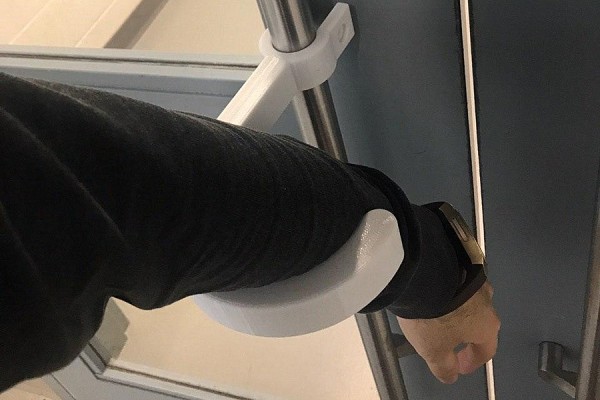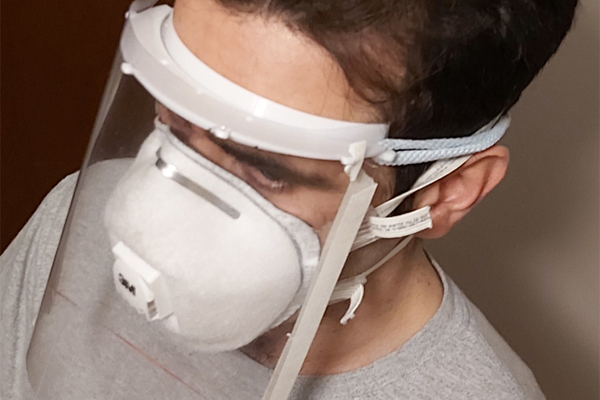 A team in Windsor Engineering has designed an attachment for door handles that allows users to open doors with their forearms.
A team in Windsor Engineering has designed an attachment for door handles that allows users to open doors with their forearms.
A group of researchers at UWindsor’s Faculty of Engineering has designed face masks, hands-free attachments for door handles, and is making parts for face shields and ventilators to help combat the spread of the COVID-19 virus.
Master’s student Alireza Pasha and doctoral candidates Hamed Kalami and Morteza Alebooyeh have been brainstorming with engineering professor Jill Urbanic since the pandemic hit.
“This is our rapid response to the current situation,” Pasha said.
The group first began making brackets for face shields on the 3D printer in Dr. Urbanic’s lab, partnering with Kevin Taylor from Kelcom 3D. The bracket, which wraps around the wearer’s head, is an improvement on the many designs currently available in that it fits snugly to the forehead, better preventing exposure to pathogens.
“The top part of the face shield is covered,” said Kalami, who adapted Taylor’s initial idea. “This is important in critical situations.”
Because the headband is flexible, it cuts down on irritation, he explained. “The face shield adapts to the user’s forehead shape. This should eliminate the pain of using it for a long time.”
The team has made some prototypes, but 3D printing is slow. They hope to design a mold to produce the brackets in higher volume, Pasha said.
Another problem, he said, is procuring the clear, flexible plastic for the shield itself. The material is in short supply around the globe.

The team’s improved face shield design adapts to the shape of the wearer’s forehead for a snugger fit.
The researchers are also designing hands-free openers for doors. Pasha said they came up with the idea while he and Aleybooyeh visited the lab recently.
“We came up to a door and we didn’t want to touch the handle.”
The team designed a J-hook attachment so people can use their forearms to pull a door open. It works on doors with vertical bars for handles, but the team has designed versions for other types of door handles, too.
The graduate students are also using the 3D printer to make prototypes of face masks and parts for ventilators.
Urbanic said her team has procured some specialty epoxy to make a mold for a low-volume production run of the products.
The team has a conference call daily to come up with products and improve their design ideas to combat the spread of the novel coronavirus.
“While there has been no recognized treatment for the virus to the moment, effective prevention with these high-demand supplies and tools is of the most importance,” Alebooyeh said.
Urbanic credits her students for putting their expertise and ingenuity to good use.
“All of us have been wanting to help,” she said. “This is our duty to society.”
—Sarah Sacheli
